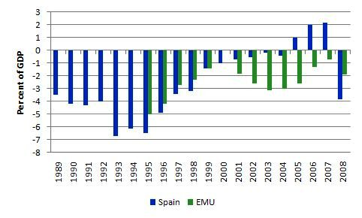By Marshall Auerback
Pick your poison. In the words of Greek Finance Minister Evangelos Venizelos, the choice facing Greece today in the wake of its deal with the so-called “Troika” (the ECB, IMF, and EU) is “to choose between difficult decisions and decisions even more difficult. We unfortunately have to choose between sacrifice and even greater sacrifices in incomparably more dearly.” Of course, Venizelos implied that failure to accept the latest offer by the Troika is the lesser of two sacrifices. And the markets appeared to agree, selling off on news that the deal struck between the two parties was coming unstuck after weeks of building up expectations of an imminent conclusion.
In our view, the market’s judgment is wrong: an outright default might ultimately prove the better tonic for both Greece and the euro zone.
The only questions that remain to be resolved are these: have all of the parties begun preparations to mitigate the ultimate impact of an outright default by Athens? And will the ECB be sufficiently aggressive in combating the inevitable speculative attacks on the other members of the euro zone periphery, which are almost certain to ensue, once Greece is “resolved” one way or the other.
Within the Troika, the Germans in particular have been the champions of taking the toughest line possible against the Greeks and other “Mediterranean profligates”. But however stubborn Berlin appears to be, the Merkel Administration is certainly not stupid. At this juncture, it seems more rational to view their ongoing promotion of fiscal austerity as a political smokescreen: In reality, what Germany likely wants to do in the case of Greece is trigger is an involuntary default so that the other PIIGS don’t get the wrong idea and ask for a similarly large haircut on their debts. They realize the consequences that might follow, as the others gear up for similar treatment. Far easier were Greece to move toward involuntary default, in the eyes of Berlin.
Politically, of course, the Merkel government can’t actually come out and advocate a Greek default or, indeed, outright expulsion from the euro zone. Far more politically astute to promote fiscal austerity on top of yet more fiscal austerity, (even though that is certainly not winning Mrs. Merkel any popularity points in Greece), until the Greeks themselves scream “Uncle!” and default outright.
It helps domestically as well. According to polls Angela Merkel is now the most popular politician in Germany, which is why she persists with this pernicious narrative that the problems of Greece all stem from fiscal profligacy and laziness, in contrast to the responsible and hard-working German people.
Ultimately, though an involuntary default carries risks for the stability of the euro payments system, a deal, per the terms outlined in the press, is bad for Greece. And probably even worse for global markets, especially the bond markets.
Either eventuality creates problems but default is probably the less bad option longer term. Let me elaborate:
Greece is a hopelessly uncompetitive economy that probably shouldn’t be in the euro zone. But can you surgically detach Greece if it defaults, without some sort of impact on the entire euro payments system?
And what will the impact be on Greece itself? The country currently runs a primary budget deficit (excluding interest payments on debt) of around 5% of GDP. Were it to default, Athens would be forced to go cold turkey (“cold Greece”?) until the primary fiscal deficit (now around 5% of GDP) is balanced. Maybe the government could suspend all military expenditures as a first pass? At the very least, they can stop buying German military equipment!
No question, that under a default, a lot of public sector employees will be sacked, pensions will be at risk, and unemployment will almost certainly go higher. But that is certainly going to occur under the deal now being struck. Were the country to revert to the drachma, however, they would likely be left with a substantially weaker currency, which could ultimately provide the country with the wherewithal to compete in the global economy. With a super-cheap exchange rate, Greece could become a Mecca for retirement homes, research hospitals, trans-European liberal arts colleges, and maybe low-overhead software startups. Plus, a permanent home for the Olympics. It could live happily ever after, as Florida does, on the pension income of the elderly and the beer money of the young.
This would be the source of the foreign transfers that the private banking sector won’t make anymore. In Greece’s case that credit went to the public sector and a lot of it built useful infrastructure, so it’s not a waste, but the first step is surely to cancel the debts and stop the illusion that they can be paid. And it would end the “death by 1000 cuts” currently being imposed on the Troika, which will serve no useful economic, political or social purpose.
Of course, there will be a slew of defaults and an endless series of court cases, litigation, etc., much as there was when Argentina defaulted in 2001. But it would force the issue of debt restructuring on the table in a meaningful way and at least provide Greece with light at the end of the tunnel.
To ensure some sort of viability of the drachma, the Greek government would have to find a more credible means of ensuring tax compliance. Most Greeks with money have presumably already moved it beyond the reach of the Greek banking system, so that savings would not be wiped out. As the tide of repossessions begins, many of these oligarchs would likely start to buy back the Greek assets on the cheap, as it is doubtful that the euro banks will want anything to with them.
Beyond that, it would be important for Athens to establish a new tax system that minimises tax evasion, so as to create demand for the new drachma immediately, and mitigate the formation of an extensive parallel transactions currency. After all, it is possible that many Greeks might prefer to use the existing stock of euros in the country and there is very little the EU authorities could do to stop this (much as the US government could not prevent Panama from dollarising its economy). But in order to establish a long-lasting demand for drachmas, two things would have to happen:
- The Greek government would announce that it will begin taxing exclusively in the new currency.
- The Greek government would announce that it will make all payments in the new currency.
Given the country’s history of tax evasion on income tax, a national real estate tax would likely work better than a new income tax.
(See here for more details:)
On the other hand, the challenge for the European Union authorities is to ensure that speculative capital is not unleashed on the next weakest link in the chain – say, Portugal – to ensure that there is an adequate firewall established and to minimise disruptions to the entire euro payments system. It’s unclear to me whether the euro zone authorities have truly thought this aspect through and considered the best means to prevent a major disruption of the EMU payments system. Then again, perhaps this is what the ECB’s new programs are really all about.
On the other hand, I happen to think a rescue of the sort that is now being publicly mooted is worse for both sides. The imposition of yet more fiscal austerity on Greece will exacerbate the debt deflation dynamics which are destroying the country and will provide Greece with ZERO means of servicing even the reduced levels of debt. The country will still remain uncompetitive and depression like conditions will continue, with the ongoing burden of more euro denominated debt servicing.
More dangerous is the risk that comes if there is a “successful” deal: It come with the pending question- ‘if Greece doesn’t have to pay, why do I’- The Irish are asking that question already, and I’m sure the Portuguese and Spanish will soon be asking the same thing. As my friend Warren Mosler has noted:
Possible immediate consequences of that discussion include a sharp spike in gold, silver, and other commodities in a flight from currency, falling equity and debt valuations, a banking crisis, and a tightening of ‘financial conditions’ in general from portfolio shifting, even as it’s fundamentally highly deflationary. And while it probably won’t last all that long, it will be long enough to seriously shake things up.
Longer term, a Greek default could well provoke the question, “What on earth do governments issue bonds for anyway?” That might well provoke a far more provocative debate on the nature of modern money and the self-imposed legal constraints with which sovereign governments bind themselves in their conduct of fiscal policy. But that’s probably best left to the pages of another blog post!













